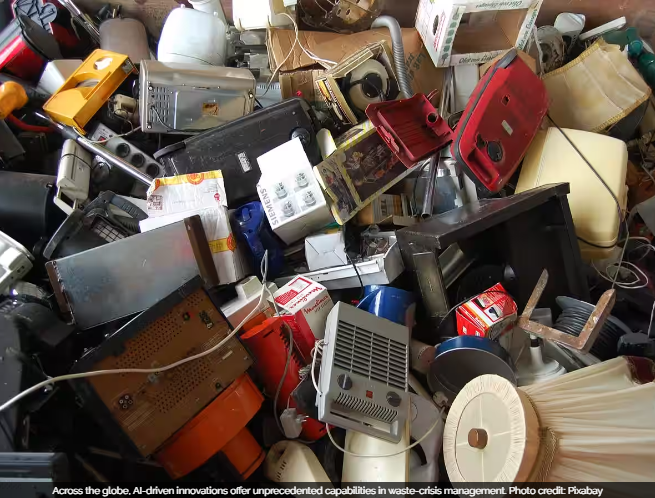Addressing this issue is paramount, as improper disposal of e-waste poses significant environmental and health risks.

In an era defined by rapid technological advancements, the proliferation of electronic devices has become an integral aspect of modern life. However, the exponential growth in electronic consumption has led to a pressing concern: electronic waste, or e-waste.
Addressing this issue is paramount, as improper disposal of e-waste poses significant environmental and health risks. Consequently, there is a critical need to implement effective e-waste management strategies to mitigate these adverse effects and pave the way for sustainability.
E-waste originates from a multitude of sources, including obsolete electronics, discarded appliances, and outdated gadgets. Using artificial intelligence for waste sorting and identification can improve system accuracy from 72.8 to 99.95 per cent. Through the integration of artificial intelligence (AI) technologies, we can revolutionise e-waste management practices, enhancing resource recovery, minimising environmental pollution, and promoting a circular economy.
According to Yuvraj Bhardwaj, Director/Chief Executive Officer, Prometheus E-Waste Recycling Solutions, innovation is the key to solving our planet’s most pressing challenges and AI-driven technology in e-waste management is changing how we approach sustainability.
“These innovations allow us to extract valuable content from electronic waste with unprecedented accuracy and speed. With advanced algorithms and machine learning, we can identify and separate electronic devices, increasing productivity and reducing waste. Furthermore, AI-driven systems can increase the traceability and transparency of e-waste recycling, ensuring compliance with legal and ethical standards By tracking the entire lifecycle of electronic products controlling it, from production to disposal, we can hold manufacturers accountable for environmental impact and encourage sustainable practices,” Bhardwaj said.
Radhika Kalia, MD, RLG Systems India Pvt. Ltd., feels that advanced AI technologies would play an increasingly vital role in enhancing the efficiency of e-waste management, significantly reducing environmental impact.
“Across the globe, AI-driven innovations offer unprecedented capabilities in waste-crisis management. These include waste-to-energy technologies, AI-equipped smart bins, waste-sorting robots enabled by computer vision and machine learning, AI’s predictive models, plastic pyrolysis, AI for logistics, along with smart surveillance for illegal dumping prevention, among others. Many of these technologies may not be very prevalent in India, but there is a lot of thought, planning, and research going on in these areas. Yes, it would take time and processes to integrate these technologies into daily operations across domains in the country, and there would have to be customizations to suit them to specifically e-waste management processes, but I am optimistic it would be done. Fostering sustainable practices through AI would enable us to streamline operations and significantly contribute to a circular economy, paving the way towards a more sustainable and efficient future,” she summed up.
Article Credit: zeebiz